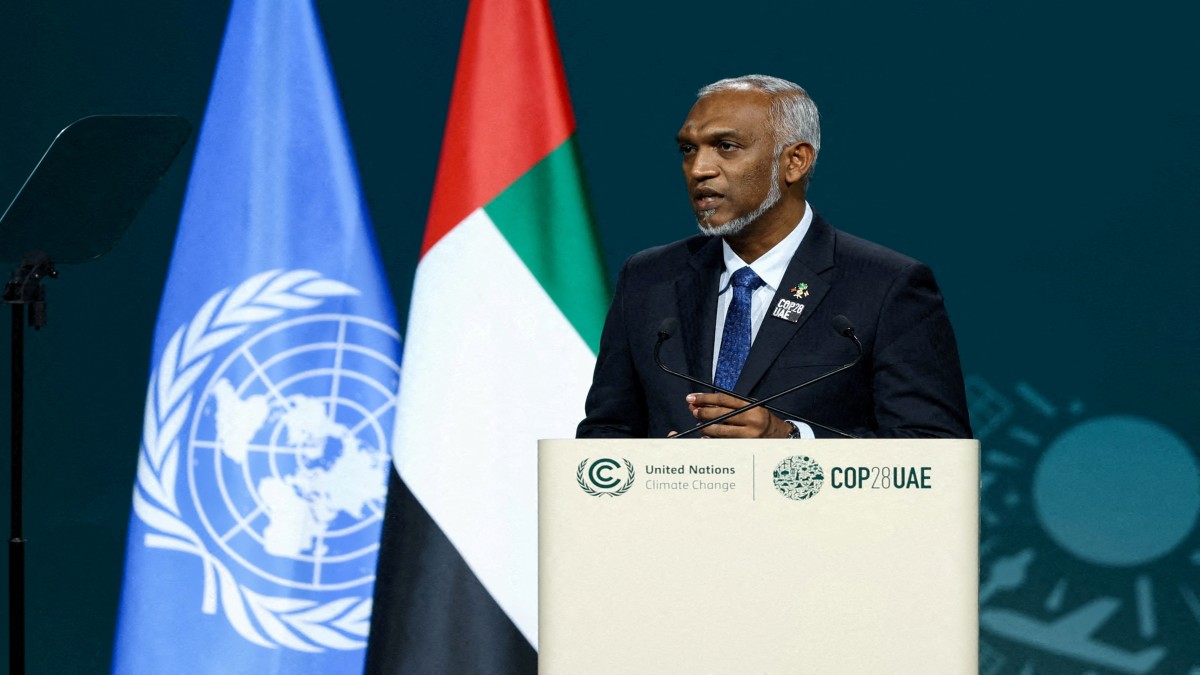Days after Maldives Opposition claimed that Indian troops have not departed but returned in civilian clothing, Maldives President Mohamed Muizzu on Tuesday said that come May 10, the “Indian troops will not be residing in the country in any form of clothing”.
According to a news portal Edition.mv, while addressing the Baa atoll Eydhafushi residential community during his tour across the atoll, the president said that due to his government’s success in expelling Indian troops, people spread false rumours and attempted to twist the situation.
“That these people [Indian military] are not departing, that they are returning after changing their uniforms into civilian clothing. We must not indulge such thoughts that instill doubts in our hearts and spread lies,” the portal quoted Muizzu, widely regarded as a pro-China leader, as saying.
“There will be no Indian troops in the country come May 10. Not in uniform and not in civilian clothing. The Indian military will not be residing in this country in any form of clothing. I state this with confidence,” he said, on a day when his country signed an agreement with China to receive free military aid.
Muizzu’s statement comes less than a week following the arrival of an Indian civilian team in the Maldives to assume control of one of the three aviation platforms in the island nation, well ahead of the March 10 deadline agreed upon by both nations for the withdrawal of Indian military personnel.
Impact Shorts
More ShortsLast month, after a high-level meeting in Delhi on February 2, the Maldivian foreign ministry announced that India would replace its military personnel operating the three aviation platforms in the Maldives by May 10, with the first phase of the process to be completed by March 10. Muizzu reiterated similar sentiments in his inaugural address to Parliament on February 5.
There are currently 88 military personnel stationed at the three Indian platforms, which have been providing humanitarian and medical evacuation services to the Maldivian population for the past few years, utilizing two helicopters and a Dornier aircraft.
Muizzu ascended to power last year on an anti-India platform, and within hours of assuming office, he called for India to withdraw its personnel from the strategically positioned archipelago in the Indian Ocean.
The Edition.mv report further said that while the first troops to depart the country are the Indian military personnel operating the two helicopters in Addu City, the military personnel present in Haa Dhaalu atoll Hanimaadhoo and Laamu atoll Kahdhoo are also expected to leave ahead of May 10.
India had agreed to remove their troops from Maldives under the condition that a number of their civilians equivalent to the military presence are brought to operate the aircraft.
The Opposition has been directing criticism at the administration asserting that the Indian personnel sent to Maldives as civilians are in reality military officials out of uniform and that the government has no way to ascertain otherwise, added the report.
Meanwhile, local media reports also said that Maldives has successfully tied up with Sri Lanka to run flights for medical evacuation last week, further indicating that it is bent on removing all Indian troops in whichever category.
Further highlighting that securing true independence is a concept he regards with utmost priority, the President remarked that the State is exerting efforts with due importance to regain the southern maritime area deprived of the country in addition to expelling Indian troops from the Maldives.
“I am confident we can achieve this. The delay in concluding this task is due to the adverse procedures practiced during the implementation. It was done without even taking the matter to the parliament … in violation of the Constitution as well,” the portal quoted the President as saying.
The Maldives’ proximity to India, barely 70 nautical miles from the island of Minicoy in Lakshadweep and 300 nautical miles from the mainland’s western coast, and its location at the hub of commercial sea lanes running through the Indian Ocean Region (IOR) gives it significant strategic importance.
The Maldives has been India’s key maritime neighbour in the IOR and it occupies a special place in its initiatives such as SAGAR (Security and Growth for All in the Region) and the Neighbourhood First Policy.'
With inputs from agencies
)